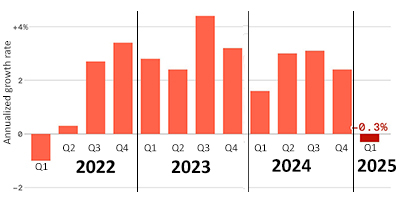

That was fast. Many economists have been predicting a recession as a result of Donald Trump's tariffs. The most widely accepted definition of a recession is two consecutive quarters of negative GDP. Now we have the first quarter in the books. During Q1, GDP dipped by 0.3%. That's not much, but it is negative. If Q2 is negative as well, we will formally have a recession. Here is the quarterly annualized growth rate since Q1 2022:

All recessions are equal but some recessions are more equal (or less equal). If the only people who are aware of the recession are the green eyeshade folks with Ph.D.s in macroeconomics at the National Bureau of Economic Research, there won't be much political blowback. But if we get a humdinger of a recession, with huge job losses, then some folks will sit up and take notice. If a big recession is combined with inflation, then pretty much everyone will notice and Donald Trump will have some explaining to do. He is already blaming the Q1 negative growth on Joe Biden, but we doubt that will work. A recent Marist College poll shows that already 60% of Americans think it's Trump's economy, not Biden's.
This GDP stuff is a bit arcane. There was a big increase in imports in Q1 as businesses and retailers ordered large amounts of stuff to beat the expected tariffs. Imports count against GDP because, well, economists say it does. In the end, what matters is not the arcane math, but whether unemployment goes up and whether inflation goes up. Historically, they usually go in opposite directions most of the time. When people are unemployed, they buy fewer products and companies are forced to lower prices to entice buyers, so prices go down when unemployment goes up and vice-versa. But once in a while, that doesn't hold due to special circumstances.
Not all economic indicators are negative, though. Consumer spending and business and residential investment are up 3%. Personal consumption expenditures are up 1.8%. One indicator that works out differently for different people/groups is the value of the dollar. It dropped about 10% against the euro in Q1. A cheaper dollar makes imports more expensive but American exports cheaper. Walmart does not want a cheaper dollar but Boeing does.
What happens in Q2 will depend a lot on what happens with the tariffs. Will the Dealmaker-in-Chief make a deal with Chinese President Xi Jinping? Who knows? Xi has plenty of cards. (V)